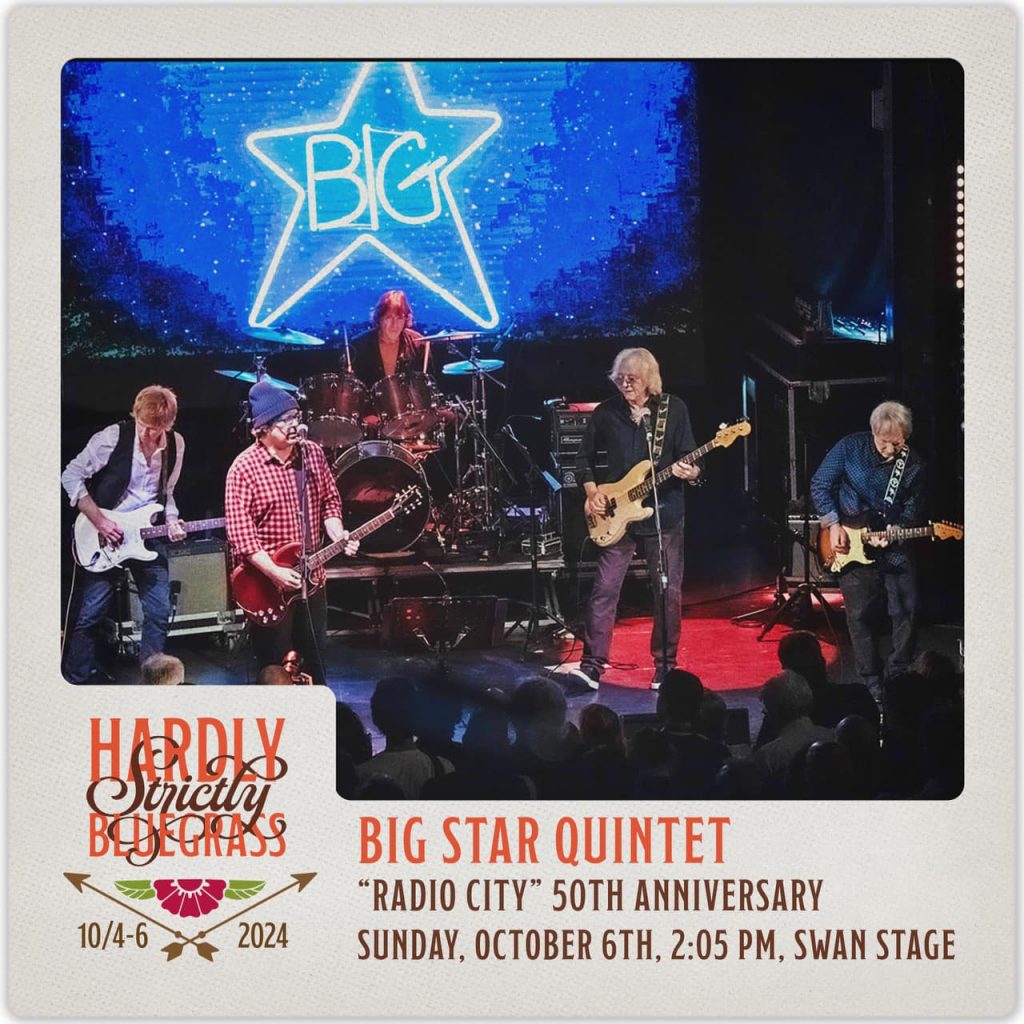Legendary Rockers Big Star Take Over Golden Gate Park for 50-year Anniversary of Groundbreaking Album

[SF Gate]
SFGATE assistant local editor Amanda Bartlett braved the heat wave to see the Big Star Quintet play a tribute to 1974’s “Radio City” at Hardly Strictly Bluegrass
In another universe, Big Star probably would have sold out Chase Center on the last leg of some nationwide arena tour. But on a rare 89-degree afternoon in Golden Gate Park, as a sea of sunburnt faces mobbed Hardly Strictly Bluegrass to witness a legendary lineup of musicians pay tribute to the little-known Memphis band that became one of the most influential rock acts of all time, they seemed right where they were supposed to be.
The band had played a sold-out show at the Great American Music Hall the night before, but this was no audience of stragglers who didn’t feel like springing for tickets. With joints and melting ice pops in hand, thousands of people leaned over the guardrails as the supergroup known as the Big Star Quintet took the Swan Stage for the free show: Posies guitarist Jon Auer, R.E.M. bassist Mike Mills, Wilco keyboardist Pat Sansone, the dB’s guitarist Chris Stamey and Big Star’s lone surviving member, drummer Jody Stephens. Everyone was drenched in sweat, and I noticed one fan forgo drinking his Miller High Life so he could dump it over his head for a moment of relief.
“I know it’s hot … I’m feeling a little guilty,” Stephens, 72, said with a sheepish smile, watching fans pass around a communal can of sunscreen before he launched into “Way Out West.” The jangly, guitar-driven ballad about a fraying relationship is among the most memorable on the band’s sophomore record “Radio City” — and it’s one Stephens sang himself on the original recording five decades earlier.
It was 1974, and the group named after a now-defunct Memphis grocery store chain was hoping to finally make their big break. Their second studio album, splashed with a scarlet-red ceiling captured by art photographer William Eggleston on the front and a portrait of the band partying at a TGI Fridays on the back, had been carefully crafted for air time and was poised to become an instant hit. Instead, it disappeared without a trace, and even people who heard the record on a local radio station and wanted to buy it couldn’t find it anywhere.
Though “Radio City,” like its 1972 predecessor “#1 Record,” became a critical darling, with some in the press likening Big Star to the Beatles, it failed to achieve commercial success. The Memphis band reportedly played just seven live shows before calling it quits in the aftermath of distribution issues and a collapsing label, as well as the departure of principal songwriter Chris Bell, who was largely credited with shaping the band’s sound and later died in a car crash at the age of 27. After their final album “Third/Sister Lovers” sold even fewer copies than the first two, Big Star faded into obscurity.
“There was a sadness to it, because those are some of the best songs made in that decade, and they just didn’t get heard,” Mills of R.E.M. said in the 2013 documentary tracing the band’s history, “Big Star: Nothing Can Hurt Me.”
Yet, the influence of Big Star’s earnest vocals and prescient power pop sound formed the DNA of just about every alternative rock group that came after, inspiring the likes of Teenage Fanclub, the Bangles — who covered the band’s seminal hit “September Gurls” — and the Replacements, who named one of their songs for the late Big Star singer Alex Chilton. Albums were reissued by award-winning labels like Omnivore, and the dB’s Stamey released new singles by both Chilton and Bell. Famously, “In The Street” was performed by Cheap Trick for the theme song of “That ’70s Show.”
Chilton, who had long insisted he wanted to go in a different direction creatively, seemed resigned to the band’s newfound attention. “You keep buying ’em, I’ll keep signing ’em,” he said with a shrug to one fan who asked him to autograph a copy of “Radio City” nearly two decades after its release. So, it came as a shock to everyone who knew him when early rumblings of a reunion began in 1993, and he agreed to revisit Big Star’s discography again, bringing in Stephens as well as the Posies’ Auer, who credited him as a kind of mentor. They scheduled sporadic gigs together, playing to thousands of fans they never had a chance to see, until Chilton died of a heart attack in 2010 — the same year original bassist Andy Hummel died after a 2-year-long battle with cancer.
In spite of the tragedy, the new lineup for the quintet was formed, with Stephens committed to keeping Big Star’s legacy alive for future generations. Onstage at Hardly Strictly, he seemed wistful as he looked out at the boisterous crowd, the shimmering Stratocaster sound floating over the eucalyptus trees. He acknowledged the connection with modern audiences has been “enormous.”
“We’ll never have Alex up there on stage and that’s as sad as it gets,” he told the Chestnut Hill Local before a Philadelphia show in August. “Nobody’s ever gonna deliver these songs like Alex, with his touch. But we all love the music and that’s what counts. Everybody takes it to heart.”
Continue to read article here.